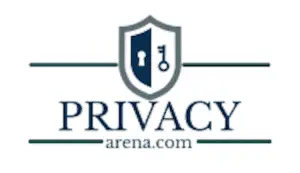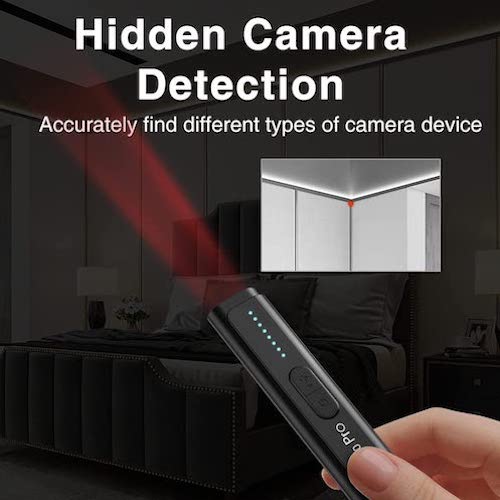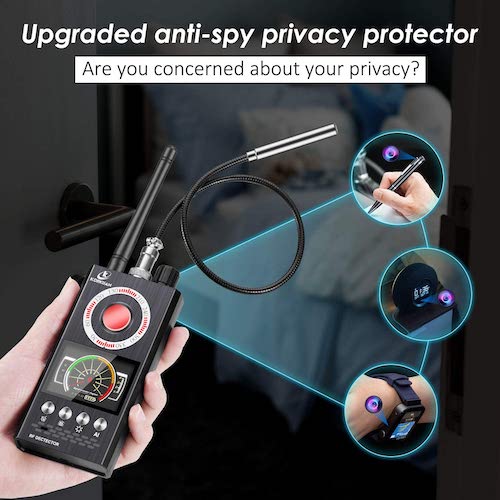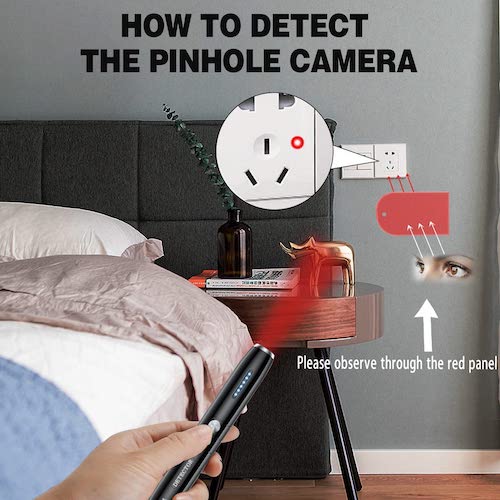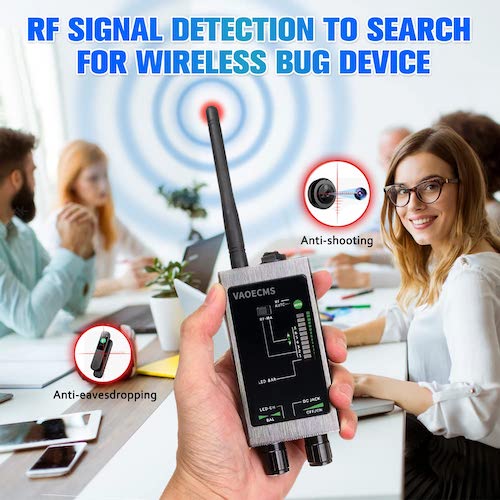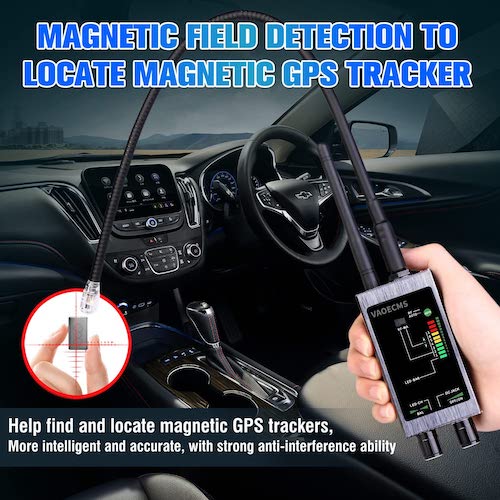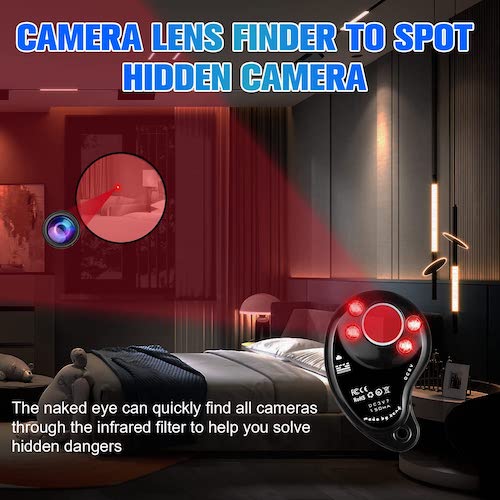You’re preparing for your next vacation and have finally found the perfect hotel. You’re excited to relax and enjoy your time away from home, but suddenly you remember an article you read just a few weeks ago about a couple who discovered a hidden camera in their hotel room.
You start to worry and wonder: could there be hidden cameras in your hotel room?
You’re not alone. With increasing reports of privacy violations and hidden cameras found in hotels, many travelers are becoming more concerned about the presence of hidden cameras in their rooms.
In this article, we’ll dive into the issue of hidden cameras in hotel rooms and explore the legal considerations, privacy concerns, and best practices for protecting your privacy during your stay. From understanding the laws surrounding hidden cameras to learning how to detect hidden cameras, we’ll provide a comprehensive guide to help you stay informed and protected.
Is It Legal to Have Cameras in Hotel Rooms
Laws regarding hidden cameras in public and private buildings can vary by country and state, but generally, it is illegal to install hidden cameras in private areas, including hotel rooms, without the knowledge and consent of the individuals being recorded.
In the United States, for example, it is legal for hotels to install cameras in public areas, such as lobbies and elevators, but it is illegal to install them in private areas without informing guests. In general, privacy laws protect people’s Fourth Amendment rights to not being watched or recorded in areas or spaces where they have a “reasonable expectation of privacy”, and it is illegal to record any audio or video in a private area without the knowledge of those being recorded.
In the European Union, data protection laws generally prohibit the use of hidden cameras in private areas unless there is a legitimate reason for doing so, such as for security purposes.
Hotel owners who are caught violating privacy laws can face severe legal consequences, including possibly hefty fines. Guests who discover hidden cameras in their rooms may also have legal recourse, such as the right to file a complaint with the hotel or take the matter to court.
Travelers need to be aware of the laws in the country and state they are visiting to understand their rights and protect their privacy while staying in a hotel.
Hotel Rooms Privacy Concerns
With the rise of affordable and easily accessible technology, the use of hidden cameras in hotel rooms has become a growing concern for travelers. A survey by IPX1031 in 2019 showed that 58% of participants were worried their hosts may have installed hidden cameras inside their Airbnbs, and 11% indicated they had actually found a hidden camera in an Airbnb.
This highlights the growing concern about privacy violations in hotel rooms and the need for travelers to be proactive in protecting their privacy.
This is particularly important since hidden cameras can pose a significant threat to privacy and personal safety. They can be used to record and collect sensitive information, such as financial and personal data, which can be used for identity theft and other criminal activities. Additionally, hidden cameras can also be used to invade someone’s personal space and dignity, leading to emotional trauma and a loss of trust in the hotel industry.
Everyone has a right to privacy, and hotel rooms are no exception. The right to privacy in hotel rooms is protected by law in many countries, and individuals can expect that their privacy will not be violated while staying in a hotel. However, with the increasing use of hidden cameras, travelers need to be vigilant in protecting their privacy and advocating for their rights.
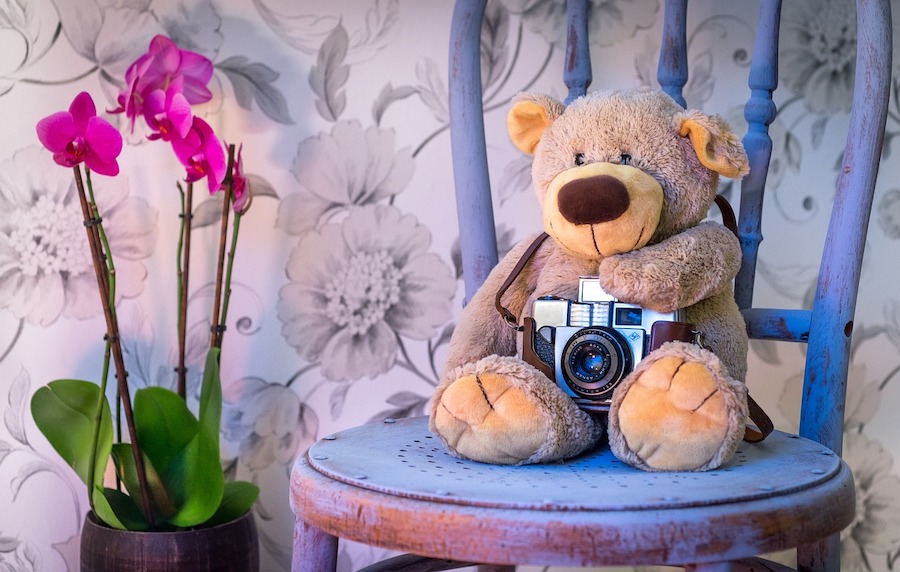
Hidden cameras can be placed in many areas in a hotel room, and they can be disguised as everyday objects to make them more difficult to detect. Some common places where hidden cameras are placed include smoke detectors, clocks, books, electrical outlets, and stuffed teddy bears.
However, hidden cameras can also be placed in less obvious objects or locations, such as behind mirrors, inside air vents, and in tissue boxes.
Here is a list of some more uncommon places where cameras may be hidden:
- Inside light fixtures.
- In or near plants.
- In the TV or cable box.
- In the bathroom fixtures, such as the soap dispenser or shampoo bottle.
- In the room phone.
- In the room safe.
How to Detect Hidden Cameras in Hotels
There are several techniques and commercial devices that can help you detect hidden cameras in your vacation rental. Here are some tips for how to find hidden cameras in Airbnb (or hotel rooms):
Do a Visual Inspection:
Whether you are traveling for work or pleasure, one of the most basic, yet effective, methods for detecting hidden cameras in your Airbnb or hotel room is by performing a thorough visual inspection of the space.
A good starting point is to look for any strange items or fixtures that may be out of place such as a mirror or wall clock in an unusual spot, an alarm clock on a table at an odd angle, a book next to the bed that looks out of place, or a stuffed animal left next to the TV facing the bed or sitting area. These could potentially contain a camera.
Challenges of visual inspection include the fact that hidden cameras can be very small, making them difficult to spot. Additionally, some cameras are often very well disguised as everyday objects and blended in with the environment. It is important to take note of any suspicious-looking items and inspect them thoroughly.
Here are some helpful tips for inspecting the room and any suspicious objects:
- Take your time and inspect all corners of the hotel room or Airbnb.Pay attention to any suspicious-looking items or objects that are out of place.
- Examine common hiding places such as smoke detectors, alarm clocks, or wall chargers, but also pay attention to uncommon places such as plants, soap dispensers, tissue boxes, etc.
- Look for a tiny hole or a black button that may be a lens.
- Check for wires or buttons that seem out of place or may have been added to the room following an upgrade. Make sure to check the TV and cable box for any suspicious-looking wires or components, and look for wires running along the ceiling or wall.
- Be sure to pay special attention to objects that can be rotated or adjusted as they might be hiding tiny cameras.
- If there are any suspicious mirrors or framed paintings on the wall, check the back carefully for any signs that a camera has been installed.
- Look for any signs that may suggest that electrical outlets, light switches, or vent covers have been tampered with. If they’re loose or missing a screw then inspect them carefully.
Look for an LED Light
Hidden cameras often have an LED light. This light can serve multiple purposes, but most commonly it’s either a status indicator (to indicate if it’s recording, transmitting, or in standby mode), or an IR light for night vision if the cameras are recording in the dark.
You can read more about why security cameras have a red light in this article.
To detect a hidden camera’s LED light, pay close attention when doing your visual inspection of the room. If present, the LED light is typically very small. The light may be red, yellow, blue or green, may be solid or flashing, and will typically be hard to spot in a well-lit room. However, if you turn off the lights, the LED light from the camera will stand out more easily.
Another way to detect a hidden camera’s LED light is by using your phone’s camera to scan the room. This will only work if the hidden camera has a night vision IR LED light, and will be particularly useful if the hidden camera emits IR light of a wavelength outside the range of human vision (visible light has wavelength of about 400-700 nanometers).
To do this, simply open your phone’s camera app and scan the room slowly. If there’s an IR LED light from a hidden camera, your phone’s camera will detect it and you’ll see a white solid or flashing light. This is much like using your mobile phone’s camera to see the flashing IR light emitted by a remote control when you push a button.
One challenge with using this method is that not all cameras may have an LED or IR light, or this function may be disabled. In this case, you won’t be able to detect the camera using this method. This is where a hidden camera detector may come in handy. Keep reading to learn more.
Use a Flashlight:
A flashlight can be an incredibly helpful tool for detecting hidden cameras in hotel rooms and Airbnbs. And if you didn’t pack a flashlight, you can just use the one on your phone!
You may think identifying hidden cameras would be an impossible feat, but with a little bit of detective work and, of course, your trusty flashlight, you can easily detect if any suspicious objects in your room have reflective surfaces – the most telltale sign of a camera lens. And since all cameras have lenses with a reflective surface, it’s an effective way to detect them in your space quickly and discreetly!
By shining your flashlight from multiple angles on different suspicious objects around the room, any secrets will certainly come to light. So next time you book a stay somewhere, be sure to bring along your flashlight for extra safety!
Challenges of using a flashlight to detect hidden cameras include the fact that some cameras lenses may be very small and difficult to spot. Additionally, modern camera lenses often have an anti-reflective coating which may reduce the effectiveness of this method. Lastly, even if you have a strong flashlight, if the light does not fall on the lens at the correct angle, it may not be visible.
Here are some tips to make your efforts using a flashlight to detect hidden cameras more successful:
- Turn off the light and draw the curtains in the room before you start your search. The reflection from the camera lens will stand out more in the darkness and be easier to spot.
- Shine your light from multiple angles on every object including those that are not usually suspicious such as lights, paintings, etc.
- Move slowly across the room so you can catch any reflections off small hidden cameras.
- Shine the light on objects at varying distances.
Invest in an RF Detector or Camera Lens Finder
If you’re serious about protecting your privacy while you’re in a hotel or a vacation rental, a radio frequency (RF) detector or camera lens finder might be worth an investment.
An RF detector is a device that can detect radio frequency (RF) signals. Spy cameras that transmit their feed wirelessly will usually emit a radio frequency signal which can be picked up by an RF detector.
The device will scan the vicinity for RF signals and will give an audible and/or visual indicator when it detects a signal, and the indicator will increase in intensity as you come closer to the source of the signal, much like a metal detector gives a signal which increases in pitch as you get closer to a hidden metal object.
One limitation of these devices it that they can pick up any RF signal in their vicinity. In other words, they may pick up any wireless signals in the vicinity such as Wi-Fi router signals.
Another limitation is that if the spy camera does not transmit the feed wirelessly and instead stores videos on a local memory such as an SD card, or transmits the feed over cable, then these cameras will not emit any RF signal and thus won’t be detectable by an RF detector. This can give you a false sense of security, thinking there aren’t any hidden cameras in the room when in fact there may be some that you’re not able to detect.
A camera lens finder is another type of device that can be used to detect hidden cameras in Airbnb and hotel rooms. The way this work is very simple and similar to using a flashlight to detect spy cameras.
Camera lens finders usually have a series of blinking lights on one surface. These lights surround a colored viewfinder, which is commonly red to dim out other colors. The camera lens finder is held with the blinking light directed at the suspicious objects in the room as you look through the viewfinder from the other side.
If there is a hidden camera, the blinking light from the camera lens finder will be reflected off the camera lens and you will see it as a blinking spot of light. The beauty of a lens finder is that it will detect hidden cameras whether they transmit their feed wirelessly or not.
So which is better? An RF detector or camera lens finder?
I don’t think either one is better than the other. In fact, I would say their functions are complementary to one another, even affordable consumer models available on the market today have both functions. You can use an RF detector to search for any radio frequency signals that may indicate the presence of a hidden camera, then use the lens finder to try and locate the device.
Use a Bug Detector App
Bug detector apps are available for download on mobile phones on both Android and iPhone and can be used to detect hidden cameras. These apps work by using the phone’s camera to scan the room for infrared signals emitted by hidden cameras, or using a magnetic sensor in your phone to look for magnetic activity similar to one that would be generated by a camera.
What to Do if You Find a Hidden Camera
If you find a hidden camera in your hotel room or Airbnb, there are several important steps you can take to protect your privacy.
- First and foremost, DO NOT touch or remove the camera! This is evidence and you’ll want leave it the way it is until you’ve had a chance to document and report it.
- Document the camera with photos and videos. Take pictures and/or videos of the camera from multiple angles. Make sure your pictures show clearly the camera, its exact location and the surrounding area, and any wires or cables connected to it.
- Report the camera to the hotel management. If you’re staying at an Airbnb, then you might want to contact Airbnb support and report the incident to them. When you report your findings, make sure you keep evidence that you reported the incident like a copy of the report or report number, and ask them what the next steps are.
- Report the incident to the police. In most states, it is illegal to install hidden cameras in private areas, so you may want to file a police report, and while you’re doing so, provide them with the evidence you collected and a record of your report to the hotel management or Airbnb support.
- Check out from the hotel or Airbnb immediately and go to another hotel. If you’ve found a spy camera in one of their rooms, it’s likely there are more in other rooms. When you’re checking out, ask for a refund. I would imagine anyone would be entitled to a full refund under these circumstances.
- The next day, or as soon as there is an opportunity, speak to a lawyer about your legal rights and how you should pursue them.
Best Practices for Protecting Your Privacy in Hotel Rooms
Protecting your privacy in when traveling is essential, whether you are staying at a hotel or Airbnb. Here are some best practices to ensure your stay is as private as possible:
Do Your Research Before You Book Your Stay
When selecting a hotel, it is important to prioritize privacy. While some hotels may advertise privacy measures prominently, it is wise to do your own research to confirm those claims.
Before booking a hotel, it is best practice to read online guest reviews. Look for statements mentioning the staff’s respect for guest privacy, any mention of hidden cameras, surveillance cameras in private areas, or any other privacy violations.
It is also important to look into the hotel’s privacy policy and policy on surveillance, to make sure you’re comfortable with their practices, as most hotels may have cameras in public areas. And, if there are particular locations in the hotel where you would not feel comfortable being watched by a surveillance camera, such as around a pool, spa, or gym area, it would be within your rights to give the hotel a call and ask if these areas have cameras installed before you book your stay.
It’s also a good idea to check for hotel policies on collecting and storing guests’ personal information. Fortunately, many major hotel chains now regularly practice data privacy measures to ensure the security and confidentiality of customer data, and these measures should be clearly outlined in the hotel’s privacy policy.
Additionally, see if the hotel has the option of having contactless check-in by using their app or website to avoid long questioning at reception.
Finally, if you’re traveling to a different state or country, research the local laws on privacy and surveillance. Many countries have specific laws governing the use of security cameras in public and private spaces, so it’s important to stay informed while staying at the hotel/Airbnb property.
Ultimately, researching ahead of time can help ensure that you choose a property most likely to respect your right to privacy during your stay.
Taking Personal Precautions
In addition to choosing the right hotel, there are some personal precautions you can take to protect your privacy during your stay at a hotel or Airbnb. These include:
- Being aware of your surroundings and keeping personal items out of view of windows or cameras.
- Drawing the curtains when it gets dark outside to block the view from windows.
- Using the hotel safe to secure any personal items that might contain sensitive information.
- Disconnecting or removing any devices in the room that you don’t need or trust.
- Not connecting to the hotel’s Wi-Fi if you don’t have to. Consider using your cell data if you have a high data plan.
- Using a VPN to mask your identity if you have to connect to the hotel’s Wi-Fi.
- Turning off Bluetooth and other wireless connections if they’re not needed.
- Avoid providing unnecessary information when booking (date of birth, etc.)
- Avoid using the computers in the hotel lobby or business center to access any personal information.
- Consider using a privacy screen protector on your laptop or other devices if you have to use them in the hotel.
These are some simple steps that you can take to ensure your privacy and security while staying at a hotel room or Airbnb. By following these best practices, you can help protect your privacy and ensure that you have a safe and enjoyable stay in your hotel room.
Final Thoughts
The issue of hidden cameras in hotel rooms is a serious one that affects many travelers. With the increasing use of technology and the rise of the sharing economy, it is important to be vigilant and take steps to protect your privacy. Whether you are staying in a hotel room or an Airbnb, taking the necessary precautions can help ensure a safe and secure stay.
If you are interested in learning more about privacy and security, be sure to check out our other articles about cameras in elevators, movie theaters, and public libraries. Stay informed, stay safe, and enjoy your travels!
